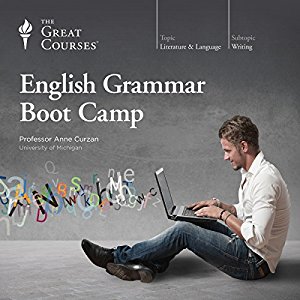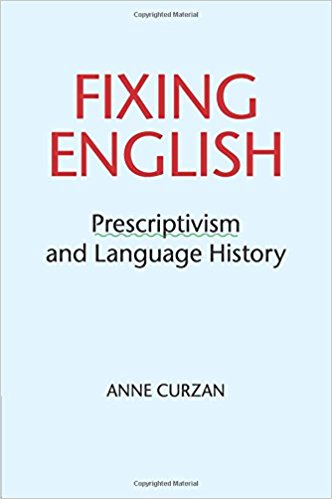 Fixing English: Prescriptivism and Language History
Fixing English: Prescriptivism and Language History
“Over the past 300 years, attempts have been made to prescribe how we should and should not use the English language. The efforts have been institutionalized in places such as usage guides, dictionaries, and school curricula. Such authorities have aspired to ‘fix’ the language, sometimes by keeping English exactly where it is, but also by trying to improve the current state of the language. Anne Curzan demonstrates the important role prescriptivism plays in the history of the English language, as a sociolinguistic factor in language change and as a vital meta-discourse about language. Starting with a pioneering new definition of prescriptivism as a linguistic phenomenon, she highlights the significant role played by Microsoft’s grammar checker, debates about ‘real words’, non-sexist language reform, and efforts to reappropriate stigmatized terms. Essential reading for anyone interested in the regulation of language, the book is a fascinating re-examination of how we tell language history.”
 How English Works, 3rd Edition
How English Works, 3rd Edition
A major introductory language/linguistics textbook written specifically for English and Education majors, this book is an engaging introduction to the structure of English, general theories in linguistics, and important issues in sociolinguistics. This accessible text provides more extensive coverage of issues of particular interest to English and Education majors. Tapping into our natural curiosity about language, it invites all students to connect academic linguistics to everyday use of the English language and to become active participants in the construction of linguistic knowledge. The second edition provides updated examples of language change–including new slang and other word coinages, grammatical developments, and sound changes–as well as new research findings on American dialects, language acquisition, language evolution, eggcorns, English and the Internet, and much more.
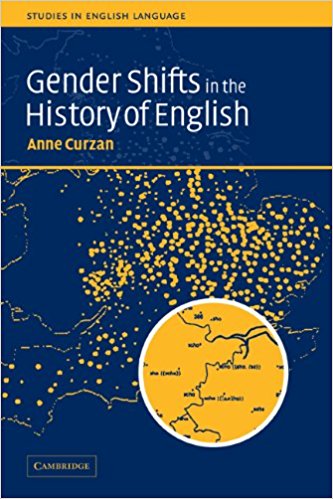 Gender Shifts in the History of English
Gender Shifts in the History of English
How and why did grammatical gender gradually disappear from English? English used to have a gender system like German, and it was replaced by a system where the gender of nouns and the use of personal pronouns depend on the natural gender of the referent. How is this shift related to “irregular agreement” (‘she’ for ships) and “sexist” language use (generic ‘he’) in Modern English? Gender Shifts in the History of English, with studies based on extensive corpus data, makes a major contribution to History of English as well as language and gender studies by providing a historical perspective on these often controversial questions.
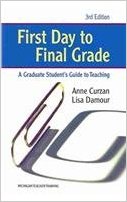 First Day to Final Grade, 3rd edition
First Day to Final Grade, 3rd edition
First Day to Final Grade: A Graduate Student’s Guide to Teaching is designed to help new graduate student teaching assistants navigate the challenges of teaching undergraduates. Both a quick reference tool and an engaging read, the book focuses on the “how tos,” such as setting up a lesson plan, running a discussion, and grading, as well as issues specific to the teaching assistant’s unique role as both student and teacher. The second edition incorporates newer teaching and learning pedagogy. The authors have modified sections on moving from class goals to class content, preparing for and running discussions, addressing problems within the class and with particular students, and responding to academic misconduct. In addition, the book has been updated to reflect the role of technology both inside and outside the classroom.
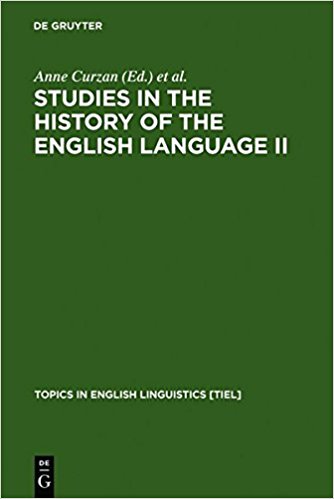 Studies in the History of the English Language II
Studies in the History of the English Language II
Studies in the History of the English Language II: Unfolding Conversations contains selected papers from the SHEL-2 conference held at the University of Washington in Spring 2002. In the volume, scholars from North America and Europe address a broad spectrum of research topics in historical English linguistics, including new theories/methods such as Optimality Theory and corpus linguistics, and traditional fields such as phonology and syntax. In each of the four sections — Philology and linguistics; Corpus- and text-based studies; Constraint-based studies; Dialectology — a key article provides the focal point for a discussion between leading scholars, who respond directly to each other’s arguments within the volume. As a whole, the volume captures an ongoing conversation at the heart of historical English linguistics: the question of evidence and historical reconstruction.
Audiovideo Courses
“English Grammar Boot Camp takes you on an enjoyable exploration of the essential aspects of English grammar. These spirited and accessible lectures offer a comprehensive core training in all of the key elements of grammar and usage, in their most immediate, practical application. Discover a breadth of perspective and context you won’t find elsewhere, improving your grammar competence and confidence in all contexts.”
 The Secret Life of Words: English Words and Their Origins
The Secret Life of Words: English Words and Their Origins
“In The Secret Life of Words: English Words and Their Origins, you’ll get a delightful, informative survey of English, from its Germanic origins to the rise of globalization and cyber-communications. Award-winning Professor Anne Curzan of the University of Michigan approaches the subject like an archaeologist, digging below the surface to uncover the story of words, from the humble “she” to such SAT words as “conflagration” and “pedimanous.””
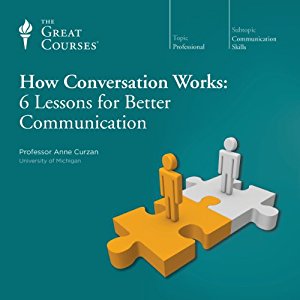 How Conversation Works: 6 Lessons for Better Communication
How Conversation Works: 6 Lessons for Better Communication
“Being a great conversationalist requires practice and effort. The good news is it’s a skill set anyone can acquire and refine. In just six lectures, How Conversation Works: 6 Lessons for Better Communication will teach you key strategies that can dramatically improve your ability to converse with anyone, from strangers to supervisors. Delivered by award-winning English professor Anne Curzan of the University of Michigan, this highly practical course focuses on the fundamental principles you need to know to become more conversationally aware and savvy at home, in the workplace, and beyond.”
